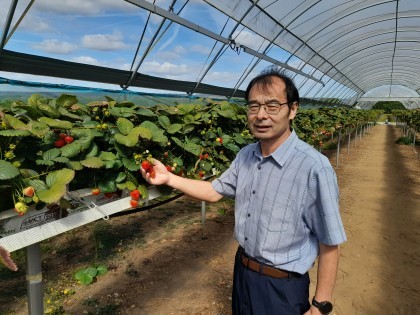United Kingdom
19 Sep 2024

A new five-year £3 million genetic research programme aims to advance the breeding of more sustainable and resilient varieties of soft fruit crops in the UK.
The Defra-funded Soft Fruit Genetic Improvement Network (GIN) will be led by the crop research organisation NIAB, with James Hutton Institute and ADAS as key partners, beginning work in Summer 2024. This new investment in soft fruit research follows in the footsteps of major agricultural crops, including pulses, oilseed rape and wheat, with a co-ordinated research approach to pre-breeding genetics of key traits and new breeding tools. These GINs have provided a key link between industry and academia to ensure that genetic research addresses the needs of the industry, and tackle some of the longer-term issues through breeding efforts.
Professor Xiangming Xu, Director of Research at NIAB, explains that the Soft Fruit GIN will advance new biotechnology tools and generate significant genetic data and resources. “The results will help breeders introduce beneficial traits so crops can be grown more productively, with less environmental impact.”
Specific targets within the research programme include understanding genetics of improved tolerance to pests and diseases and increased water and nutrient use efficiency in strawberry and raspberry. It will also develop genetic tools and resources for two underutilised soft fruit crops - blackberry and honeyberry - to assess whether there is potential to increase their production in the UK.
The Soft Fruit GIN will be run in close partnership with the soft fruit industry and the research outputs will be made freely available.
Professor Xu says: “Around 83% of the fruit we consume in the UK is imported. By working with industry to deepen our genetic understanding and develop improved genetic resources and tools, sustainable varieties could be bred more efficiently to increase the domestic production and supply of soft fruit crops.
“The Soft Fruit GIN will bring together multidisciplinary expertise from NIAB, James Hutton Institute and ADAS to provide the sector with the data and knowledge to transform soft fruit breeding and production in the UK. The timing of this project means that we can harness the opportunities created by the recently passed Genetic Technology (Precision Breeding) Act, developing cutting-edge genetic tools to develop new resilient varieties, with reduced environmental impact.”
Dr Julie Graham, the GIN’s Research Lead at James Hutton Institute, says: “The challenges faced by the soft fruit industry are considerable and require a team effort of scientists working with industry to develop, utilise and share knowledge of genetic and genomic tools, that will allow the development of new varieties. These varieties must improve the economics of production, achieving quality and yield whilst growing with minimal inputs, being more resource efficient and resistant to abiotic and biotic pressures. The network will bring together skills and expertise to improve breeding and benefit UK production.”
Dr Andrew Gladman, the GIN’s Research Lead at ADAS, says: “We live in a time of significant transition for the soft fruit sector. With the mounting impacts of climate change alongside a continuing shift towards lower input growing systems, there is an urgent need for the development of soft fruit varieties with the resilience and traits to meet these challenges. Through close collaboration with industry and academic partners, we aim to identify and make available the pre-breeding resources needed to develop the soft fruit varieties of the future.”
The research priorities for the Soft Fruit GIN were developed with significant industry stakeholder involvement, and an advisory committee will oversee the work to ensure it remains relevant to industry challenges. It runs until June 2029.